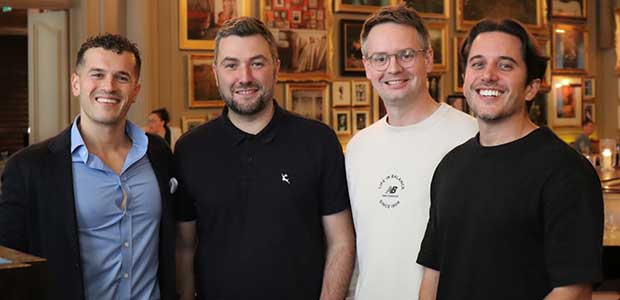
Cocreatd achieves £100M+ portfolio value in first year
Cocreatd, the British venture studio founded by serial entrepreneurs Oliver Yonchev, James Lawson Barker, Paul Stevens, and Simon Whittaker, has announced its portfolio is valued at over £100 million from a standing start just 365 days ago.
The studio's unconventional approach has delivered a 48.8x return on invested capital, with seven of its 11 portfolio companies already profitable.
In an industry where traditional venture capital assumes 90% failure rates, Cocreatd has achieved a seven-figure exit to System7 and an IPO of a security company on the Main Market of the London Stock Exchange within its first year of operations, whilst maintaining an average EBITDA margin of 42% across its portfolio.
"We've proven that there's another way to build venture-scale businesses," said Oliver Yonchev, Founder of Cocreatd. "It's always baffled me that VCs built a business model assuming almost everything fails. We're not passive investors – we're builders. We're in the trenches with our founders, obsessing over everything from typography choices to strategic decisions that define a company's future."
The venture studio model, 95% self-funded by its founders, has attracted 15 entrepreneurs to join as co-founders across its portfolio companies. Notably, Cocreatd achieved a creation-to-exit timeline of just eight months for its System7 acquisition, and took its security venture from concept to LSE listing in six months.
"Being naive has been our fuel," added Yonchev. "We don't have what I call the 'curse of knowledge' that traditional VCs suffer from. This technology moment, particularly with AI, is rewriting the rulebooks – it's not just technical talent that can build great businesses anymore."
Cocreatd's approach represents a distinctly British innovation in venture building. Rather than pursuing unicorn valuations through massive capital deployment, the studio focuses on capital efficiency and sustainable growth. This constraint-led innovation has resulted in profitable businesses that don't require millions in funding to validate their models.
"Britain built empires, but seems stuck in a rut of talking itself down. We need more of that audacious spirit here," noted Yonchev. "If we were an actual fund, I suspect you'd be hard-pressed to find a better performing one globally, certainly for capital efficiency within 12 months. British inventiveness isn't dead – it just needed a different model."
The studio's success demonstrates the strength of British entrepreneurship when freed from traditional venture capital constraints. By backing founders who don't fit the typical VC stereotype and embracing a hands-on building approach, Cocreatd has proven that world-class technology businesses can be built from the UK without following Silicon Valley's playbook.
Looking ahead to 2026, Cocreatd plans aggressive expansion. "When we set out, our mission in year one was to back and create ten companies. We've exceeded that," said Yonchev. "Our ambitions accelerated. Our immediate returns have only improved our ambition. In 2026, we intend to back 10 more across a wider remit."

